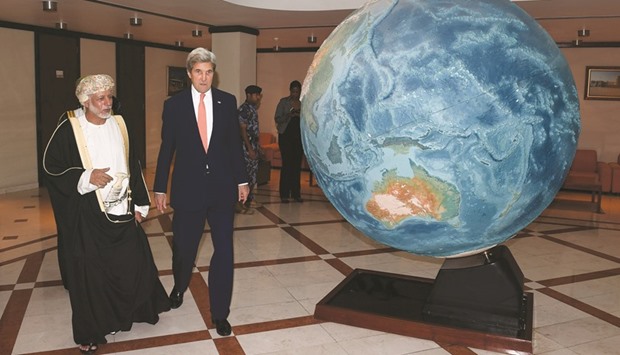US Secretary of State John Kerry held talks yesterday with officials in Oman on efforts to end Yemen’s 19-month-old conflict, state media in Muscat said.
Kerry met with Oman’s ruler Sultan Qaboos to discuss “the conflict in Yemen and the urgent need to find a durable political settlement to ease the suffering of the Yemeni people”, said US State Department spokesman John Kirby.
Kerry and Oman’s Foreign Minister Yusuf bin Alawi discussed the “peaceful and humanitarian role played by the sultanate in Yemen,” ONA state news agency reported.
They welcomed a peace roadmap proposed by UN envoy Ismail Ould Cheikh Ahmed that was rejected by Yemen’s President Abd-Rabbu Mansour Hadi, he added.
Kerry also “expressed the United States’ deep appreciation for the helpful role Oman played in securing the recent release of US citizens held in Yemen”.
Oman maintains good ties with Iran which is accused of supporting Yemen’s Shia Houthi rebels.
Muscat is also a member of the Gulf Co-operation Council (GCC), led by regional powerhouse Saudi Arabia, which backs Hadi’s internationally-recognised government.
It has mediated the release of several Westerners held in Yemen, the latest being an American identified as Wallead Yusuf Pitts Luqman who was transported to Muscat from rebel-held Sanaa on an Omani military aircraft on November 7.
Oman is the only GCC member not taking part in the Saudi-led military coalition bombing rebels in Yemen since March 2015, but it still maintains good ties with Saudi Arabia.
Kerry’s visit to Oman was one of his last trips as secretary of state before President Barack Obama’s administration steps down in January.
The US chief diplomat has been pushing for a settlement in Yemen, where the deadly conflict between rebels and the government escalated after the Saudi-led Arab coalition intervened on the side of the government.
Oman has also used its links to mediate peace talks between the insurgents and Hadi’s government.
More than 7,000 people have been killed and nearly 37,000 wounded in Yemen since March 2015, and the UN says millions are in need of food aid.
Another 21mn people urgently need health services, according to the United Nations.

US Secretary of State John Kerry meets with Oman’s Foreign Affairs Minister Yusuf bin Alawi bin Abdullah in Muscat, Oman, yesterday.
